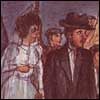Chabad-Lubavitch rabbis and rebbetzins wear many hats: Torah teachers, educators, mediators, hosts, cooks, party-planners, communal leaders. And because of their direct work with people, publically and privately, and frequently in time of need, it’s quite often that they end up in the position of marriage counselors as well.
Rabbi Aaron L. Laine, long-time spiritual leader of the Sinagoga Beth El and the Ashkenazi community of Panama, wrote a book about the topic (released this fall), “GPS for a Happier Marriage.” In it, he imparts the wisdom he has gained from decades of speaking with and counseling couples.
Here, the rabbi shares his experiences, impressions and some tried-and-true marriage advice.
Q: How did you first find yourself in the business of counseling couples, and how did you learn the ropes of the trade?
A: My wife and I came here 21 years ago after the local Ashkenazi community requested that the Chabad-Lubavitch headquarters in Brooklyn, N.Y., help them find a rabbi.
The Jews here are very traditional people. So it is just natural that when issues arise in a marriage, the first place they go for advice is to the rabbi. I was married for all of four months at the time, so I really didn’t have much experience myself. But I was thrown right into the deep end, so I learned to swim.
Over the years, I searched for and identified the common threads and recurring patterns that were found in many of the marriages I was asked to help with. And that became the basis for my book.
Q: If you had to distill your marriage advice to a few lines, what would that be?
A: We need to recognize that men and women are different; we are so different that often we cannot understand each other. As long as we keep on projecting our understanding through our lens—thinking that it would apply to our spouse—we’re going to keep on hitting brick walls.
Seeing how we tick so differently helps us relate.
Q: Can you give a practical example from your own life?
A: Before I got married, I studied in yeshivah. There, we spent many hours a day poring over Talmudic texts, parsing the meaning of passages and teachings that are thousands of years old. We spent a lot of time arguing over how they are to be understood. After a lively back-and-forth, we’d often come to a conclusion—or conclude that there was no definitive conclusion. In any case, arguing your case and doing it well is considered a virtue in the male yeshivah world.
I soon learned that this does not work in marriage. You can convince your wife why it doesn’t make sense to get a new carpet—why the new ones are of worse quality, and the old one is still so pretty—but she won’t feel any better.
Q: And extending that concept to people who have not learned in yeshivah ...
A: A woman may come to her husband and complain about something, whatever it is. He will immediately begin to discuss whatever it is that she brings up, trying to prove how it’s not his fault or trying to find ways to fix the issue. Nine out of 10 times, that won’t help. The issue is not what’s really bothering her. She is unhappy, perhaps feeling unappreciated, and the example was just her way of demonstrating how she is feeling.
On the flip side, a man may come home from work and not want to talk to his wife. She sees that he is not sharing and feels like he has no need for her, does not value her opinion and isn’t interested in sharing life with her.
Both of them are misreading their spouses because they are trying to understand their spouse the same way they understand themselves. Once we understand that we don’t understand, we can get somewhere.
Q: There are thousands of books on marriage. What’s your basic approach, and what’s unique in your understanding of men and women?
A: Beyond discussing the differences between the behaviors of men and women, I was able to identify these differences on an existential level, and this is unique.
One point I like to say is that it all breaks down to the three ‘P’s and the three ‘A’s. I have found that in the majority of cases, all the things that a man seeks for his self-esteem fall into one of three categories, what I call the three P’s: Prestige, Power and Pleasure. And women are driven by their need for Affection, Appearance and a sense of Accomplishment, the three A’s.
Understanding this helps us understand why our spouses often approach things so differently than we do.

Q: As a rabbi, what Jewish concept do you think is most important for marriage?
A: Chassidic teaching has a lot about achieving the ideal of bittul—self-abnegation—a state where you are not driven by your own desires, needs or sense of self, but by the greater cause. The same applies to marriage. A person needs to stop thinking about what he or she is getting out of marriage and instead concentrate about what he or she is giving. Once that happens, everyone will be happy.
From a Jewish perspective, marriage is not something we enter into to have families or to gain companionship. It is part of our spiritual development and the fulfillment of our purpose as part of G‑d’s grand plan for the universe. We need to put in the necessary effort to uplift ourselves and do this G‑dly task in the very best way we can.
“GPS for a Happier Marriage” can be purchased at Jewish bookstores or online here.









Join the Discussion